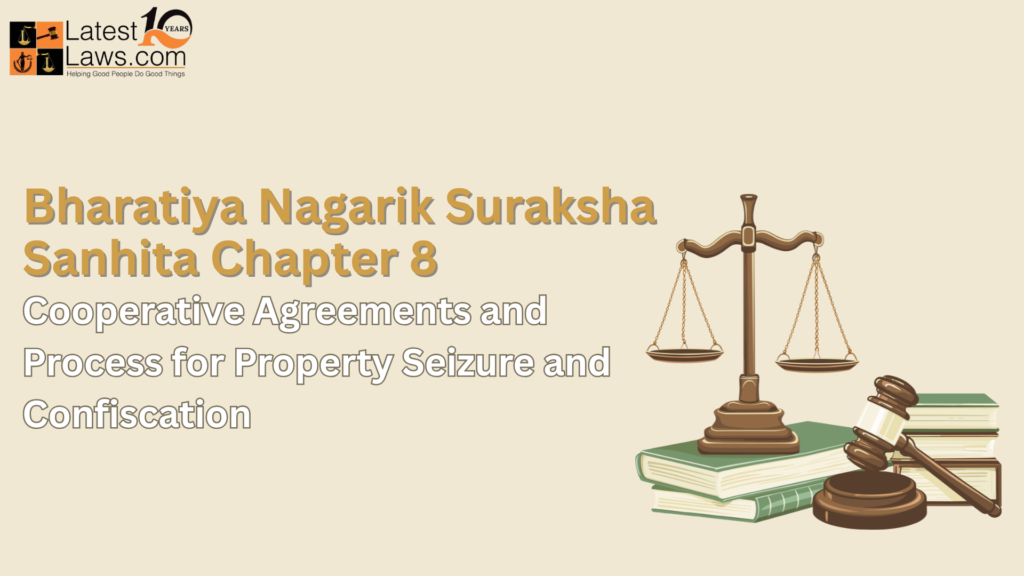
Introduction
The Bharatiya Nagarik Suraksha Sanhita, 2023 (BNSS) introduces a fresh approach to India’s criminal procedure system. Superseding the old Criminal Procedure Code (CrPC), this law aims to improve transparency, effectiveness, and international collaboration in criminal justice. Among its most important updates is BNSS Chapter 8, which details collaborative arrangements for assistance in certain issues, alongside the process for property seizure and confiscation.
In an increasingly interconnected world, criminals often operate across international borders, hiding assets or laundering money in foreign countries. Chapter 8 of BNSS gives India the legal tools needed to work with foreign nations in criminal investigations, and ensure that unlawfully gotten properties can be traced, seized, and forfeited, both inside and outside of India. This chapter is made up of Sections 111 to 124, with each one serving a specific function in this legal process.
Let’s examine each section in detail to understand its goal, scope, and the procedures involved.
BNSS Section 111 – Definitions
The basis of this chapter begins with the definition of key legal terms:
- “Contracting State” refers to a nation or location outside of India with which India has entered into a treaty or agreement for mutual legal aid.
- “Forfeiture” signifies the permanent loss of property due to its illegal origins.
- “Unlawfully acquired property” is property obtained through means that break any law.
- These definitions clarify the legal terms employed in the following sections and ensure a standard interpretation in courts and by law enforcement.
BNSS Section 112 – Letter of Request to Competent Authority for Investigation Outside India
Section 112 empowers Indian courts to send a letter of request to a competent authority in a foreign country for help in investigations or evidence gathering. This is particularly relevant when a part of the crime or the evidence is found outside of Indian jurisdiction.
For example, if a person is accused of hiding money in offshore accounts, Indian authorities can request the foreign country to collect bank records or statements. This provision supports international cooperation in criminal investigations and strengthens India’s capacity to pursue justice beyond borders.
BNSS Section 113 – Letter of Request from a Foreign Country to Investigate in India
In the same spirit of mutual assistance, Section 113 allows foreign countries to ask Indian courts or agencies for help in their investigations. If evidence, witnesses, or proceeds of a crime are found in India, the Indian judicial system can act upon these requests.
This aligns with India’s obligations under various mutual legal assistance treaties (MLATs) and fosters a global framework to fight crime, particularly in cases like terrorism, drug trafficking, and cybercrime.
BNSS Section 114 – Assistance in Securing Transfer of Persons
Section 114 covers the transfer of individuals between India and foreign countries for investigative purposes. This might include:
- Sending a witness or an accused individual to another country for testimony.
- Bringing a person from abroad to India for trial or providing evidence.
- However, these transfers are dependent on the consent of the individual involved and must abide by all legal safeguards, ensuring no violation of rights.
BNSS Section 115 – Assistance in Relation to Orders of Attachment or Forfeiture
Section 115 provides a legal mechanism for implementing foreign court orders related to the attachment or forfeiture of property situated in India. If a person is convicted abroad, and their illicit property is tracked to India, Indian authorities can enforce the foreign judgment, assuming it meets legal standards under Indian law.
This provision is vital for cross-border asset recovery, especially in cases of corruption and money laundering.
BNSS Section 116 – Identifying Unlawfully Acquired Property
Before seizing or forfeiting property, it has to be identified. Section 116 gives investigative agencies the power to carry out inquiries to identify property believed to be unlawfully acquired. This includes surveillance, documentation, financial audits, and data collection.
The focus here is ensuring that law enforcement agencies have a solid foundation of evidence before taking any compulsory action.
BNSS Section 117 – Seizure or Attachment of Property
Once unlawfully acquired property is identified, Section 117 allows for its seizure or temporary attachment. This stops the accused from transferring or disposing of the property during an ongoing investigation or trial.
This is a critical step in preventing asset dilution and ensuring the property is kept safe for further legal action.
BNSS Section 118 – Management of Seized or Forfeited Property
After attachment or forfeiture, the property needs to be managed efficiently. Section 118 allows the appointment of custodians, administrators, or government agencies to manage these properties until the court gives final orders. This ensures that assets are neither misused nor allowed to deteriorate.
Such provisions are especially important when the seized property includes businesses, real estate, or valuables requiring ongoing upkeep.
BNSS Section 119 – Notice of Forfeiture of Property
Section 119 makes sure of due process by requiring authorities to give a formal notice to the person whose property is being considered for forfeiture. The person must be given the chance to respond and justify the legality of their assets.
This section upholds natural justice principles, giving individuals a chance to defend their property before any permanent action is taken.
BNSS Section 120 – Forfeiture of Property in Certain Cases
When the response to the notice is unsatisfactory, and the property is shown to be related to illegal activities, Section 120 allows for its forfeiture. The court can pass orders to permanently transfer ownership of the property to the state, effectively removing any benefit the accused may have gained from criminal conduct.
This is a key legal tool in deterring economic offenses.
BNSS Section 121 – Fine in Lieu of Forfeiture
In specific cases, rather than forfeiting the property, the court may permit the owner to pay a fine equivalent to the property’s value. This is an alternative remedy under Section 121, providing flexibility in enforcement without compromising justice.
This is helpful when the property has sentimental, operational, or third-party legal importance.
BNSS Section 122 – Certain Transfers to be Null and Void
If the accused, after getting a notice of forfeiture, attempts to sell or transfer the property to get around the law, Section 122 declares these transfers invalid. This guarantees that the legal process cannot be avoided through deceitful transactions.
It discourages the use of benami or proxy transfers as a defense.
BNSS Section 123 – Procedure for Letter of Request
Section 123 provides a step-by-step process for handling letters of request, both those received and those sent out. It ensures these requests go through the correct legal channels — like the Central Government, the appropriate courts, and law enforcement agencies — to maintain credibility and legal integrity.
BNSS Section 124 – Application of the Chapter
The final section, 124, describes the application and scope of Chapter 8. It states that the provisions apply to offenses involving serious financial crimes, transnational organized crime, and other specific offenses, especially when international collaboration is critical.
Importance of BNSS Chapter 8 in Modern Legal Practice
Chapter 8 of BNSS 2023 considerably strengthens India’s ability to:
- Collaborate with foreign jurisdictions in criminal cases.
- Trace, seize, and forfeit proceeds of crime located across borders.
- Ensure justice in an era where crimes have no borders.
It also brings India closer to global standards like the UN Convention Against Corruption and FATF guidelines, positioning it as a responsible international legal player.
Conclusion
The detailed provisions under BNSS Chapter 8 – Collaborative Arrangements for Assistance in Certain Matters and Process for Property Seizure and Forfeiture build a strong legal framework for handling cross-border crimes. Sections 111 to 124 provide a clear legal path for cooperation, property identification, seizure, and forfeiture.
For lawyers, law enforcement personnel, and policy analysts, this chapter is a crucial part of the new criminal procedural law. It empowers the Indian legal system to act swiftly and lawfully to global challenges posed by organized crime and financial fraud. As India continues to become a global force, strong laws that support mutual legal assistance and property recovery are not only useful—they are essential.


























